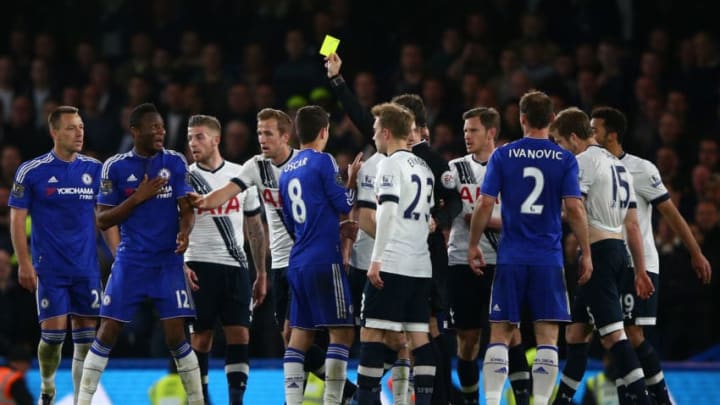Former Premier League referee Mark Clattenburg gave an insightful, reflective and highly professional perspective on his career on the Men in Blazers podcast. Chelsea fans reacted to some of his comments in a way that Troopz would find embarassing.
Last Friday, the Men in Blazers podcast featured former Premier League referee Mark Clattenburg. Three days later, the BBC posted a few isolated snippets of Clattenburg’s interview. That post formed the basis for click-bait headlines advertising hot takes with even less context than the Beeb’s article. Those mass media takes, in turn, ignited an orgiastic embarassment by Chelsea fans who somehow took offence that Clattenburg – among other high crimes and misdemeanors – let Tottenham do what they do best and bottle it at the Battle of Stamford Bridge.
Early in the interview – well before he mentioned Chelsea – Clattenburg talked about the influence of his mentor, Pierluigi Collina. Collina was Clattenburg’s true predecessor. Before Clattenburg was the world’s best referee, Collina was. Collina influenced Italian and European officiating in much the same way Clattenburg did in England and the continent.
Clattenburg told the story of how he was officiating a Champions League semifinal second leg between Bayern Munich and Barcelona. As part of his pre-match preparation, he watched the first leg match six times. Six times. He studied the teams’ tactics, the areas where they tried to push the limits of the Laws of the Game and how the players reacted to each other and the officials.
Collina was the supervising match official for that tie. Before the game, he quizzed Clattenburg on a minute aspect of how the teams exploited the offsides rule. Collina had done an intense amount of research, and he expected the on-field official to do the same. Clattenburg was up to the challenge. And before the game, he warned the teams that he knew what they were up to.
Must Read: Scouting Atletico's form, strengths and weaknesses
That was classic Clattenburg. As he puts it, he preferred to manage the game. He chose to relate to the players and reach a mutual understanding as professionals: let them know what you know. He chose preparation and common sense rather than distributing cards by rote enforcement.
This conversation provided the background to Clattenburg talking about his “game plan” for the May 2, 2016, match between Chelsea and Tottenham. The Battle of Stamford Bridge, which we all know so well.
Fans and pundits read about his “game plan” and – without the benefit of the context the media did not provide and they did not seek out – heard “desired outcome.” Clattenburg went into that game with the intention of having the smallest footprint, the lightest impact possible. He knew the more he involved himself in a match, the more he would take the blame for the outcome.
The man who is known around the world for his ego and arrogance, who has tattoos on his forearm for the major finals he has worked, wanted to avoid seeing his name in the headlines the next day. He wanted Chelsea and Tottenham to decide who would win the match and, by extension, the Premier League. He wanted Chelsea, Tottenham, Eden Hazard, Harry Kane, Moussa Dembele and Diego Costa to be the subject of conversation. Not Mark Clattenburg.
And for that, Chelsea fans are outraged. They are outraged not that he favoured Tottenham, but that he did not overtly favour Chelsea. Apparently letting Tottenham bottle it is now anti-Chelsea.
A good referee wants to have minimal impact, to be forgotten upon the final whistle. He does not want to see his name in the papers, nor himself in a video highlight. That is the difference between Mark Clattenburg and Mike Dean. Clattenburg was arrogant, but not self-aggrandizing. His games were about his vision for the game of football, not his role in it.
Clattenburg spoke with professional pride and a cognoscente’s reverence for those moments when he would play an advantage and the team used it to score a goal. Playing advantage is unique to football. No other sport allows the official to exercise his discretion in a way that favours the fluidity and beauty of the game. It captures Clattenburg’s overall philosophy on officiating. Manage it, don’t control it. Understand the rules, don’t enforce them. Be an auteur, not a policeman. And above all, let the game play.
The Battle of Stamford Bridge can be seen as 90 minutes of playing the advantage. Clattenburg was hardly a spectator nor a partisan. He awarded 12 yellow cards, nine to Tottenham. He showed three cards to Tottenham before one to Chelsea. But most importantly, he let the 22 men who matter most decide the outcome. He let nature take its course. He let Tottenham implode. He neutrally facilitated that entirely natural, organic and beautiful process.
Mark Clattenburg is one of those rare people in any profession who sets the standard in everything he does. If Clattenburg says or does something, then the default reaction should be “that is how it should be, until proven otherwise.”
Next: Antonio Conte out-coaches and out-manages his 'top six' peers
Chelsea fans ceded the intellectual high ground to Arsenal Fan TV and the proudly competitive, no-excuse high ground to Tottenham fans on Monday. Listen to the podcast before you @ me.
